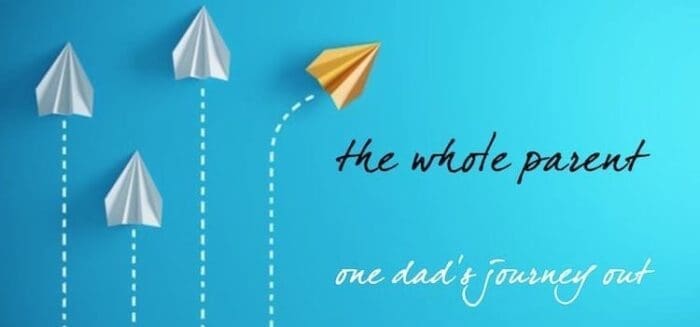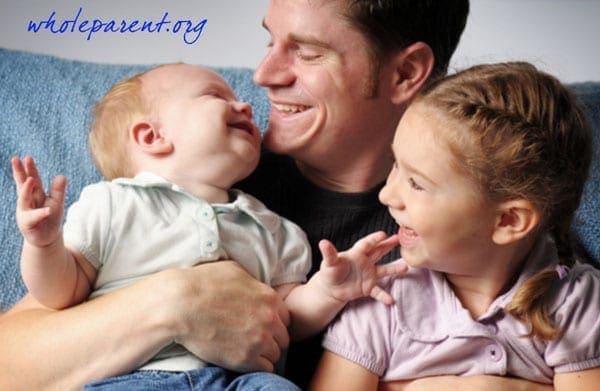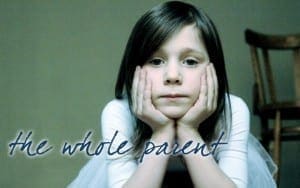I’m a part-time dad.
This weekend I had the privilege of seeing both my teenaged kids. In the divorce, I wanted to split the way we had parented, 50/50. My then-wife had other ideas and the law was behind her 100% of the way.
Part-time parenting is the obvious result of divorce: That’s not how I wanted it, that’s how my ex-wife wanted, and got it. So, eight years ago, I got the SPO (standard possession order) that is so popular in the state of Texas and other conservative states. Dads don’t have much of a chance once the wife decides she wants a divorce. If you’re happy with the traditional (mom = nurture, dad = money) stereotype and divorce process, go right ahead, file with your soon-to-be ex, go ahead and do a “collaborative divorce.” But beware, you are not getting a fair deal.
The every-other-weekend dad, born from two generations of soaring divorce rates, was once a conventional part of American culture. In recent years, more couples have been agreeing to parent after divorce as they did in marriage: collaboratively. – washington post
I did the math a while back, but the every-other-weekend with dad schedule is about 70% mom and 30% dad. Sure, they’ve written into the “order” that the non-custodial parent can have the kids for an entire month in the summer. Um, yeah, who’s got the career and money to support that idea? I know it’s for “out-of-town” dads, but still. When you can’t do the month, the real schedule leaves the dad alone, kidless, a lot more frequently than the mom.
And the stereotypes prevail. I was talking to an “evolved” single parent. A woman who passionately believes that co-parenting is the only way to raise children once the parents have separated. And she said something that I wasn’t expecting, “But in the first 5 – 7 years of life, studies show, that the kids need the mom in a different way than they do the dad.”
Bullshit.
She was justifying her belief (yes shes’ a single, divorced, mother of one) that moms are more important to kids at an early age. And she was confident she could point to the research to support her premise. I beg to differ.
It’s an old saw, the mom is more critical to the kids in the early years. It’s just not true. Some of the parts of the issue are clear when the mom is breastfeeding, but the simple belief that moms are more critical to a child’s well-being, is simply old conservative divorce laws coming up in “factual” form.
“Yes, but,” she demurred. “Do you think men, in general, provide the same level of nurturing and childcare that moms do in the early years?”
Dads Are Parents Too
Ah, the old, “typical household” argument. Dad is the one still working, so naturally, he’s the one with less time to be the center of his kids’ lives. It’s a sad departure, that first week after mom has had a baby. I would’ve given up almost anything to be the SAHD. (stay at home dad) But that was not our plan, nor would it fit into our dreams of neighborhoods and schools we hoped would give our children an edge in the competitive world landscape. So she stayed at home and I worked. “Yes,” I said, “I would agree, that “traditionally” the dad would not be as keen a nurturer as the mom, but in my experience of being a dad, that was simply not the case. I was the dad who was up before everyone else to assure breakfasts and eventual school departures happened with joy and precision. I was the dad who wrestled and chased and wreaked the happy family gene on my kids. I was known as “he who is fun in the pool” dad, because I was always willing for one more game, one more throw into the air, one more game of Marco Polo. I was a dad who was 100% engaged and 100% as nurturing as my then-wife.
Again, my friend is right, in a sense, “most men” are not experienced in being primary caregivers. And often the dad is the parent who continues to leave the home every weekday in pursuit of the money that will allow the family to continue, to eat, to rise above Maslow’s “survival” needs. The dad is asked to be the breadwinner 95% of the time. And then the typical woman, even an educated and evolved woman, point to that fact as an example of why the mom is more important to the kids during a divorce.
I was the 100% engaged dad. I also went to work every week to provide a nice home in a nice neighborhood with nice schools. But there was no doubt that we were 50/50 parents. We shared the chores, we shared the nurturing duties when I was at home, and we shared all the responsibilities of becoming good, caring, and attached parents. We were both into the attachment theory of parenting, and I was a model feeling, nurturing, loving, dad. That’s how we parented.
When my then-wife made the decision to divorce me, without telling me about it, she was making a distinct choice away from us as a family, away from me as a partner, and towards some idea that OUT would be better than IN. And, I’d have to admit she was unhappy most of the days in the last year of our marriage. So she hired a lawyer before telling me she was even considering divorce. We were even in couples counseling at the time. Um… What? Don’t you think that’s the venue to express your feelings of “considering a divorce” as a catalyst for growth and change? Instead, it sort of slipped out in a session that she’d been to see a lawyer. Um, marriage therapy over. Marriage over.
Once the sacred seal had been broken, the vow of our continued commitment shattered by her intention to do something different, there was no turning back. I was terrified. I was disoriented. I was asked to move out of the home we had created with two kids (4 – 6) one cat and one dog. I was asked to be the bigger man and give her what she wanted. I was asked to give the kids what they needed, 70% of the time going forward with mom and without me.
I fought the divorce in the beginning.
“So you think you’re going to walk out the door and suddenly be a happy person?” I asked.
And again, when one parent is ready for divorce, it does not matter what the other parent thinks, feels, or wants. The marriage, as it existed before the breach, is over. Even if she hadn’t gotten caught that day in therapy, she was already moving on. She was imagining and planning her life without me.
And under the traditional divorce laws, the map she had of the road ahead was pretty rosy for her.
- 70/30 split of time with kids
- keep the house
- get child support payments
And that’s the premise that she entered into our next round of negotiations: how do divorce with our kid’s wellbeing in mind. Yet, see, she already knew she would win exactly what she wanted. She knew if she asked for a divorce I would have to move out, I would have to pay her so it would be easier for her and the kids to afford the nice house in the nice neighborhood. She knew that she would come out a winner in the divorce. Dad would be gone, a hardship for the kids, but mom would save the day by being super-mom. Uber-mom. The best mom.
Dads are just as important as moms
throughout the entire parenting relationship.
Dad’s don’t have that option in a divorce. If we’re going to get anywhere near 50/50 parenting, we’re going to have to lawyer up and fight for it. I was not lawyering up. I was agreeing to collaborate on all aspects of my divorce. I was asked to suspend my anger, frustration, and doubt, and let the process work its way out. I was screwed from the moment she decided she wanted to break up the family.
Today, in reflection, I have to say, my ex-wife did us a favor. As unhappy as she was, there was probably little chance for any substantive change in our relationship. She was simply unhappy. And while I had spent a good portion of my energy and heart trying to heal and nurture her, I was now being asked to step up to the negotiating table and give her exactly what she wanted.
To this day I still remember with some sadness and anger, the day we began talking to our $250 hr parenting coach, who was going to help us collaborate on our parenting plan for the divorce. After a few meetings to set ground rules, establish trust, and to begin the discussions about what each of us wanted in our best-case divorce, we jumped right into doing a daily/monthly schedule for the kids.
How About Doing a 50/50 Parenting Schedule?
I had been doing some research. I brought in a cool and progressive idea around 50/50 parenting, and even proposed a calendar for us to begin negotiations from. This was my dream. If we’re going to divorce, let’s at least divorce the way we married, with the expectation and demand of 50/50 parenting. Imagine settling for anything less when entering into the negotiations about becoming a parent? I had my idea, my book of research, and even an outline on a calendar for how it might look.
Both my soon-to-be ex and the female therapist looked surprised.
After some frustrating disagreements about how the parenting plan discussion should progress, the therapist took me aside individually. “Look, John, I’m here to help you guys get to a reasonable solution in the shortest amount of time. And you need to know, if you choose to fight her on this, she’s going to get exactly what she’s asking for. So let’s keep it out of the courtroom, as I know you want, and start with the standard possession order and see what she will negotiate from that starting point.”
She sold me out. She was trying to do her job, yes, but I was paying 50% of her bill too. It was my will, my dream, my ideas of how to make the best out of a shitty situation, that was crushed out in that meeting. “This is what she’s going to get,” she said. That phrase still haunts me.
And for that acceptance, that acquiescence, giving in to the standard possession order, that myth that mom’s are more important than dads in divorce with young kids…
For that “good dad” behavior I was delivered into the non-custodial parent role with my kids about 1/3 of as much time as my wife would have. Wrong. Bummer. Hindsight is 20/20.
Today I would’ve fought. Had I known what I know today, I would’ve fought. My kids were the most important thing in my life. Much more important that my “friendliness” or compassion for my soon-to-be ex-wife. If I place my kid’s needs above all else, I know that they would’ve been better served by having me 50% of the time. No doubt in my mind. And my belief comes from how we were raising the kids as a couple. My belief comes from understanding that I was just as important in my kids lives, right then (at 4 and 6), as my wife was.
Dads are just as important as moms throughout the entire parenting relationship. Sure, there are things a dad cannot do. But the stereotype that young children need their moms more than their dads is bullshit. I’m sorry to tell my friend and co-parenting advocate that she is simply wrong. That she is seeing the universe through her experience and her lens as a mom. And I’m hopeful that she will awaken to a more holistic understanding of parenting and nurturing so that she will not perpetuate the SPO as “what’s best for the kids.”
Every time you hear that phrase, “what’s best for the kids,” make sure you’re questioning the science behind the reasoning. And make sure you examine the parenting roles prior to one of the partners deciding they wanted out. The story my ex-wife liked to tell of her parenting prowess and uber-nurturing skill, did not match up with my experience of her as a co-parent when we were married.
I love my ex-wife. I wish her well in her new life with a new husband. But she screwed me in the divorce and she and the therapist that set up our 70/30 parenting plan knew it. They were not basing their plans on science but on “what’s best for the kids” mythology that has been perpetuated since my parents got a divorce 49 years ago. Things have changed. Dads have changed. And my wife was not the better nurturer of the two, she was merely the parent that had been given the lion share of the time with the kids as I worked to provide the home for us to thrive within.
I’ve always strived to choose the positive in response to any angry brush up with my ex-wife. In trying to participate in a collaborative divorce, I was challenged to the max. I did maintain my 100% positive approach, but it may have served my ex better than it did me. Now, looking back, I am no longer angry about how our divorce went down. I don’t think it was in the best interest of the kids to have less time with me. And today I struggle with what impact my 30% dad role had on their lives. Are they more cynical because I was not around as much?
I am happy to say, in the long run, my ex-wife did a great job at parenting the best she knew how. And I will forever give her the benefit of the doubt, and frame our divorce as her doing what she thought was best for the kids. I’m pretty sure she and the therapist did not believe that out-dated matra for divorce, but I’m pretty sure that it fit nicely with what each of them wanted.
Always Love,
John McElhenney – life coach austin texas
Facebook | Instagram | Pinterest | @wholeparent
back to Positive Divorce & Co-parenting
More from The Whole Parent:
- How Soon Do You Say, “I Love You” In a New Relationship?
- New Relationships and the First Morning Together: Her Morning Elegance
- Back To The Start: Breakup to Begin Again
- The Three Essential Elements of Love
Source:
- More than 20 states in 2017 considered laws to promote shared custody of children after divorce – WaPo





